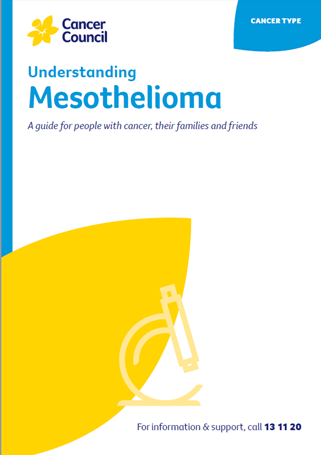- Home
- Pleural mesothelioma
- Diagnosis
- Tests
- CT scan
CT scan for pleural mesothelioma
If pleural mesothelioma is suspected, you will usually have a CT scan. A CT (computerised tomography) scan uses x-ray beams and a computer to take detailed cross-sectional pictures of the inside of your body.
Before the scan
Most CT scans are done at a hospital or radiology clinic and you can usually go home as soon as the test is over. You may be asked not to eat or drink (fast) for several hours leading up to having the scan.
Immediately before the scan, you will be given an injection of a liquid dye into a vein. This dye is known as contrast, and it makes the pictures clearer. The contrast may make you feel flushed or hot all over and leave a bitter taste in your mouth, and you may feel sick or feel a sudden urge to pee. These feelings should pass quickly, but tell someone if you feel unwell.
Before having scans, tell the doctor if you have any allergies or have had a reaction to contrast during previous scans. You should also let them know if you have diabetes or kidney disease, are pregnant or breastfeeding.
During the scan
The CT scanner is a large, doughnut-shaped machine. You will need to lie still on a table while the scanner moves around you. Getting ready for the scan can take 10–30 minutes, but the scan itself takes only a few minutes and is painless. Lying flat and still can be uncomfortable, so speak to your doctor or radiologist about any discomfort.
What a CT scan shows
The CT scan shows the location and thickness of the tumour/s in the chest or abdomen. It may also show if the mesothelioma has spread to other organs. The information from the CT scan is used to work out the best way to get tissue for testing (called a biopsy).
→ READ MORE: Biopsy for pleural mesothelioma
Podcast: Tests and Cancer
Listen to more episodes of our podcast for people affected by cancer
More resources
Dr Anthony Linton, Medical Oncologist, Concord Cancer Centre and Concord Repatriation General Hospital, NSW; Dr Naveed Alam, Thoracic Surgeon, St Vincent’s Hospital Melbourne and Monash Medical Centre, VIC; Donatella Arnoldo, Consumer; Polly Baldwin, 13 11 20 Consultant, Cancer Council SA; Dr Melvin (Wee Loong) Chin, Medical Oncologist, Sir Charles Gairdner Hospital and National Centre for Asbestos Related Diseases, WA; Prof Kwun Fong, Thoracic and Sleep Physician and Director, UQ Thoracic Research Centre, The Prince Charles Hospital, and Professor of Medicine, The University of Queensland, QLD; Vicki Hamilton OAM, Consumer and CEO, Asbestos Council of Victoria/GARDS Inc., VIC; Dr Susan Harden, Radiation Oncologist, Peter MacCallum Cancer Centre, VIC; Penny Jacomos, Social Worker, Asbestos Diseases Society of South Australia, SA; Prof Brian Le, Director, Parkville Integrated Palliative Care Service, The Royal Melbourne Hospital and Peter MacCallum Cancer Centre, VIC; Lung Cancer Support Nurses, Lung Foundation Australia; Jocelyn McLean, Mesothelioma Support Coordinator, Asbestos Diseases Research Institute, NSW; Prof David Morris, Peritonectomy Surgeon, St George Hospital and UNSW, NSW; Joanne Oates, Registered Occupational Therapist, Expert Witness in Dust Diseases, and Director, Evaluate, NSW; Chris Sheppard and Adam Barlow, RMB Lawyers.
View the Cancer Council NSW editorial policy.
View all publications or call 13 11 20 for free printed copies.
Need to talk?
Support services
Coping with cancer?
Speak to a qualified health professional someone who has been there, support groups & forum
Looking for transport, accommodation or home help?
Practical advice and support during and after treatment
Cancer information
Peritoneal mesothelioma
Learn about this type of mesothelioma, its symptoms, diagnosis, treatment, and how to manage its symptoms
Patient rights and responsibilities
What you can reasonably expect from your health care providers

